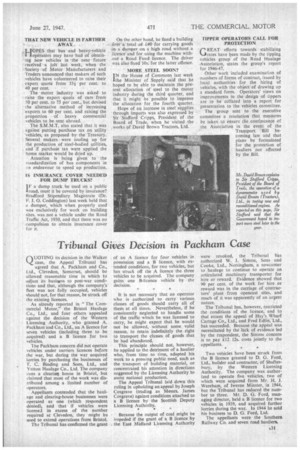Tribunal Gives Decision in Packham Case nUOTING its decision in the Walker
Page 33

If you've noticed an error in this article please click here to report it so we can fix it.
case, the Appeal Tribunal has agreed that A. Packham and Co., Ltd., Clevedon, Somerset, should be allowed reasonable time in which to adjust its business to post-war conditions and that, although the company:s fleet was not fully occupied, vehicles should not, for that reason, be struck off the existing licences.
As already reported in "The Commercial Motor," the Bristol Haulage Co., Ltd., and four others appealed against the decision of the Western Licensing Authority, who granted A. Packham and Co., Ltd., an A licence for seven vehicles (including three to be acquired) and a B licence for two vehicles.
The Packham concern did not operate vehicles under carriers licences before the war, but during the war acquired lorries by purchasing the businesses of T. C. Binding and Sons, Ltd., and Yatton Haulage Co., Ltd. The company runs a clearing house in Bristol, but claimed that most of the work was distributed among a limited number of operators.
Appellants contended that the haulage and clearing-house businesses Were operated as one (which respondent denied), and that if vehicles were licensed in excess of the number required at Clevedon, they might be used to extend operations from Bristol.
The Tribunal has confirmed the grant of an A licence for four vehicles in possession and a B licence, with extended conditions, for two vehicles, but has struck off the A licence the three vehicles to be acquired. The company gains one B-licence vehicle by the decision.
It is not necessary that an operator who is authorized to carry various classes of goods should carry all of them at all times. Nevertheless, if be consistently neglected to handle some of the traffic which he was licensed to carry, he might expect that he would not be allowed, without some valid reason, to retain indefinitely the. right to transport the classes of goods that he had abandoned.
This principle should not, however,• be applied to the detriment of a haulier who, from time_ to time, adapted his work to a pressing public need, such as the transport of building material, or concentrated his attention in directions suggested by the Licensing Authority to assist national production.
The Appeal Tribunal laid down this ruling in upholding an appeal by Joseph Cosgrave (trading as Messrs. James Cosgrave) against conditions attached to a B licence by the Scottish Deputy Licensing Authority.
' Because the output of coal might be impeded if the grant of a B licence by the East Midland Licensing Authority were revoked, the Tribunal has authorized W. J. Simms, Sons and Cooke, Ltd., Nottingham, a newcomer to haulage to continue to operate an articulated machinery transporter for hire or reward. Evidence showed that 90 per cent. of the work for hire or reward was in the carriage of contractors' plant from opencast sites, and much of it was apparently of an urgent nature.
The Tribunal has, however, restricted the conditions of, the licence, and to that extent the appeal of Hay's Wharf Cartage Co., Ltd., and Fred Edlin, Ltd., has succeeded. Because the ape-al was necessitated by the lack of evidence led by the respondent, the Simms concern is to pay £12 12s. costs jointly to the appellants.
Two vehicles have been struck from the B licence granted to D. G. Ford, Ltd., builder and contractor;of Shaftesbury, by the Western Licensing Authority. The company was authorized to operate five vehicles, two of which were acquired from Mr. H. J. Wareham, of Iwerne Minster, in 1944, but the Tribunal has reduced the number to three. Mr. D. G. Ford, managing director, held a B licence for two vehicles in 1939, and acquired further lorries during the war. In 1944 he sold his business to D. G. Ford, Ltd.
The appellants were the Southern Railway Co. and seven road hauliers.




































































































